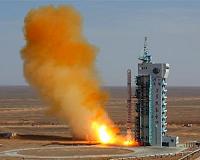 |
for Astrobiology Magazine Moffett Field CA (SPX) Mar 09, 2010 What's adding fuel to the fire of climate change? Well, fire. Some stunning images recently taken by NASA's Aqua satellite show one of the Earth's latest firestorms - this one at the Dundes Nature Reserve in Western Australia. Nearly 200,000 acres have gone up in flames as of February 18. That's a lot of carbon added to the atmosphere. The red outlines are the active fires, and the smoky clouds are - of course - smoke. Dundes comes on the heels of the one year anniversary of "Black Saturday," for Melbourne the natural disaster equivalent to San Francisco's 1989 Loma Prieta earthquake. The fire energy that ripped through communities near Melborne killing 173 people was the equivalent of 1500 Hiroshima bombs, the Sydney Morning Herald reported. Pretty intense. The American West has been cindered, too, of late. California lost nearly 340,000 acres of land, as firefighters fought 65 separate fires in a time span of July to October. The worst was Station Fire, outside Pasadena, which charred 250 square miles in September. Fires are a normal and healthy part of the natural cycle, which can make them difficult to pin directly to climate change. But the severity of fires and duration of fire seasons seem to be on the rise, owning to a drier, warmer climate in some parts of the world. A 2006 study, Warmer and Earlier Spring Increase Western U.S. Forest Wildfire Activity, published in the journal Science compared large fires since 1970 with hydroclimatic and land-surface data. Researchers reported that the length of wildfire season had increased by 64% (or 78 days), and wildfire frequency jumped particularly high in the Northern Rockies (60%). Earlier snow melt and higher temperatures were correlated with more frequent fires, the data showed. So bigger fires seem to be triggered by changing climate conditions. It's no small jump to suppose that they could also exacerbate these conditions. Between 20 to 40 percent of total U.S. carbon sequestration is held by forests. Just as there seems to be a feedback loop between fires and climate change, there's a reverse one forming with public sentiment. All the fires in Australia are turning a previously skeptical anti-Kyoto populace into climate change worriers. In a September survey by Newspoll, 72% of the Australian respondents were in favor of a carbon reduction program. And Australia recently reaffirmed its commitment to meeting Copenhagen goals of reducing carbon by 5 to 25% of 2000 levels within the next decade. This from the world's largest coal exporter.
Share This Article With Planet Earth
Related Links - Earth Observation News - Suppiliers, Technology and Application
 China Launches New Remote-Sensing Satellite
China Launches New Remote-Sensing SatelliteJiuquan, China (XNA) Mar 08, 2010 China has successfully put into orbit another remote-sensing satellite, "Yaogan IX" at 12:55 p.m.(Beijing Time) from the Jiuquan Satellite Launch Center in northwestern Gansu Province, according to a statement from the center Friday. The satellite was sent into space aboard a Long March 4C carrier rocket and would be used to conduct scientific experiment, carry out surveys on land resource ... read more |
|
| The content herein, unless otherwise known to be public domain, are Copyright 1995-2010 - SpaceDaily. AFP and UPI Wire Stories are copyright Agence France-Presse and United Press International. ESA Portal Reports are copyright European Space Agency. All NASA sourced material is public domain. Additional copyrights may apply in whole or part to other bona fide parties. Advertising does not imply endorsement,agreement or approval of any opinions, statements or information provided by SpaceDaily on any Web page published or hosted by SpaceDaily. Privacy Statement |